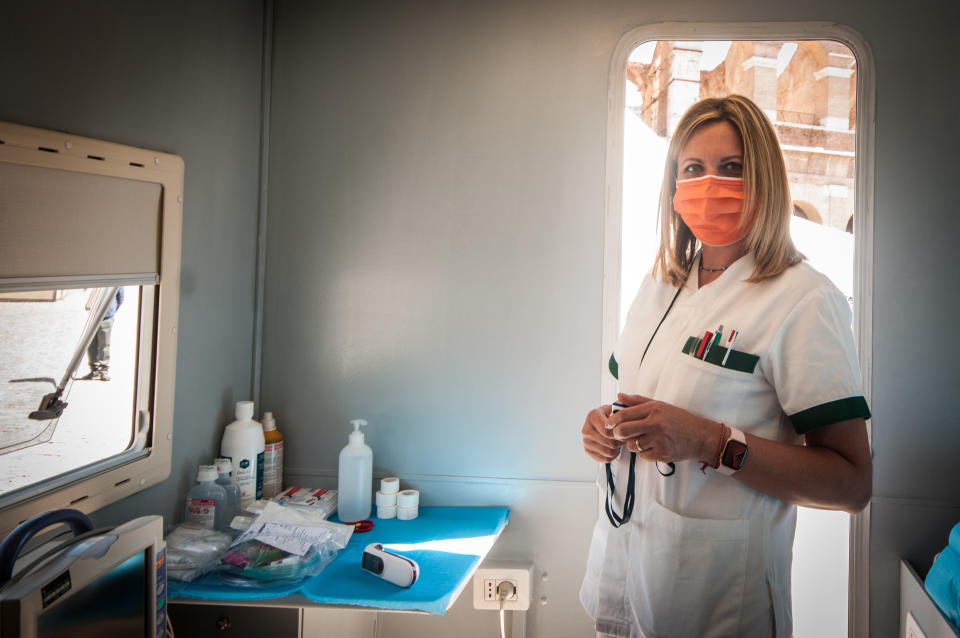Coronavirus: How can an airway infection cause diarrhoea?
With the coronavirus making headlines all over the world for months, most know to look out for its tell-tale fever, cough and loss of taste or smell.
Some may be surprised to learn, however, the respiratory infection can trigger diarrhoea.
The NHS does not recognise loose bowels as one of the three “main symptoms” but the symptom is acknowledged by the US Centers for Disease Control and Prevention, as well as the World Health Organization.
With the coronavirus considered an infection of the airways, some people may be puzzled as to how it impacts our gut.
Early research suggests the infection is mild in four out of five cases, but it can trigger a disease called COVID-19.

Coronavirus: How does it cause diarrhoea?
The coronavirus only emerged at the end of 2019, and there is still relatively little that scientists understand about the pathogen.
While the NHS identified fever and cough as symptoms early on, a loss of taste or smell was only recently added to the list.
Other signs of infection have also been noted, ranging from pink eye to discolouration of the fingers and toes.
“We call it a respiratory virus but it doesn’t only affect the airways,” Dr Nathalie MacDermott from King’s College London told Yahoo UK.
“Any viral infection can cause an array of symptoms. We call them a respiratory virus, [but] that’s just where it primarily affects or where it enters [the body]”.
Although not a coronavirus strain, seasonal flu can also cause diarrhoea.
Traces of the coronavirus have been detected in stool samples, suggesting it may spread in faeces.
“There is evidence [the coronavirus] can infect the intestine by detection of viral RNA in stools,” Professor Paul Hunter from the University of East Anglia told Yahoo UK.
The coronavirus is an RNA virus. In simple terms, RNA is a precursor to the more well-known DNA.
Professor Hunter pointed out, however, that diarrhoea is a relatively uncommon symptom, with UK hospital studies suggesting just 10% to 15% of patients suffer.
“So [the] mechanism is probably infection of the gut and cell damage,” he said.
Dr MacDermott wondered whether the coronavirus “invades the bowel wall”.
It may then trigger an “inflammatory process” that leads to abdominal pain, spasms and diarrhoea.
“Viruses alter the body,” said Dr MacDermott.
“They trigger an inflammatory process [and] the body produces chemicals to fight that virus, which can alter how the bowel or gut moves.”
Inflammation is also a protective action launched by the immune system as it works to fight off a pathogen.
Diarrhoea is not the only non-respiratory symptom the coronavirus has been linked to.
Patients – particularly children – have complained of chilblains, rashes and “COVID toes”.
“[The coronavirus] fosters a huge immune response so it can affect every part of the body,” Dr Veronique Bataille, a dermatologist at The Medical Chambers, previously told Yahoo UK.
“It could give kidney damage, heart damage.
“I would, as a medic, recommend anyone who has anything during this current climate like a rash or extreme fatigue or diarrhoea that is unusual for them to say, ‘uh oh I think I’m a carrier’.
“It’s better to be overcautious and not infect other people.”

What is the coronavirus?
The coronavirus is one of seven strains of a virus class that are known to infect humans.
Others cause everything from the common cold to severe acute respiratory syndrome (Sars), which killed 774 people during its 2002/3 outbreak.
Since the coronavirus outbreak was identified, more than 6.1 million cases have been confirmed worldwide, according to Johns Hopkins University.
Of these cases, over 2.6 million are known to have “recovered”.
Globally, the death toll has exceeded 372,100.
The coronavirus mainly spreads face to face via infected droplets expelled in a cough or sneeze.
There is also evidence it can survive on surfaces.
The coronavirus has no “set” treatment, with most patients naturally fighting off the infection.
Those requiring hospitalisation are given “supportive care”, like ventilation, while their immune system gets to work.
Officials urge people ward off infection by washing their hands regularly and maintaining social distancing.
Coronavirus: what happened today
Click here to sign up to the latest news, advice and information with our daily Catch-up newsletter
Read more about COVID-19
How to get a coronavirus test if you have symptoms
How easing of lockdown rules affects you
In pictures: How UK school classrooms could look in new normal
How public transport could look after lockdown
How our public spaces will change in the future
Help and advice
Read the full list of official FAQs here
10 tips from the NHS to help deal with anxiety
What to do if you think you have symptoms
How to get help if you've been furloughed



